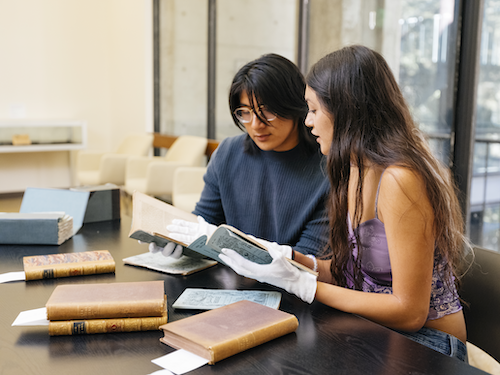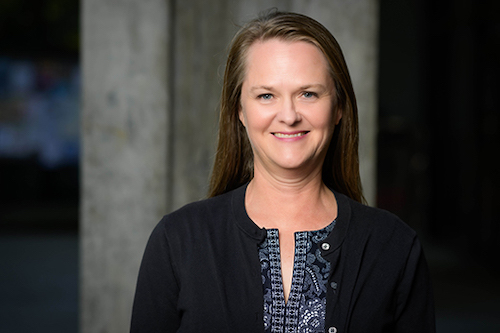UC Santa Cruz Humanities Division secures $1 million grant for Employing Humanities initiative
Investment from the Mellon Foundation will propel new program focused on experiential learning and career readiness for humanities students.

The Humanities Division at UC Santa Cruz has embarked on a transformative journey with a $1 million grant from the Mellon Foundation to launch the groundbreaking Employing Humanities initiative. This visionary program aims to redefine humanities education by providing students with unparalleled experiential learning opportunities, bridging the gap between academic studies and real-world applications.
Humanities Division Dean Jasmine Alinder, a passionate advocate for humanities-focused education, leads this innovative initiative. With a rich background in experiential learning, Alinder envisions “Employing Humanities” as a link connecting students to meaningful careers and fostering community engagement.
“Humanities gives you skills that are durable and flexible, that can really serve a student throughout the arc of their career,” Alinder said. “We’re moving in the direction of making skill-building more explicit, and giving students opportunities to see clear pathways from classroom to career.”
Engaging in experiential opportunities offers a multitude of benefits, providing participants with practical skills applicable to their future careers by translating classroom knowledge into real-world scenarios. These experiences contribute to a deeper comprehension of specific job fields and industries, shedding light on their challenges and opportunities.
Beyond professional practices and skill sets, these opportunities offer insights into personal expertise, interests, passions, and values. Participants emerge with enhanced self-confidence and leadership skills, along with a strengthened resume, providing a competitive edge as they navigate the job market.
The Mellon Foundation, renowned for its commitment to critical thinking and just communities, acknowledged the potential of the Employing Humanities initiative, proudly awarding a $1 million grant. This substantial investment reflects the foundation’s belief in empowering humanities students with the skills necessary for success in a rapidly evolving world.
The Employing Humanities initiative will revolutionize humanities education by offering undergraduate majors and minors expanded opportunities for service learning, undergraduate research, and paid internships throughout Santa Cruz County and the region. Beyond career preparation, the initiative emphasizes civic engagement and global citizenship.

Alinder, who joined UC Santa Cruz in August 2020, envisions this initiative as a response to the national decline in humanities-based degrees, positioning humanities studies for long-term success. “To counter this decline, we are outlining a comprehensive plan,” Alinder said.
In the upcoming three years, the Humanities division will concentrate on five pivotal elements crucial for the initiative’s success: expanding infrastructure to support student achievement, devising innovative curricula, diversifying faculty hires, enhancing infrastructure to support faculty research, and fostering a transformative shift in the campus culture.
Highlighting the significance of the initiative, Humanities Division Assistant Dean Amy Bruinooge stated, “We are trying to capture the success of humanities-oriented students and build a curriculum centered on career readiness and a well-rounded education.”
Alumna Theresa Bostic, who graduated this past June with a double major in history and sociology and a minor in Black studies, and was awarded an undergraduate award and research fellowship by the Humanities Institute, praised the well-rounded humanities education she received at UC Santa Cruz.
In her freshman year, she enrolled in history courses that helped her to explore the various paths she could take in her educational and professional career. Bostic was also a Humanities Institute Public Fellow and Undergraduate Research Fellow. She also had the opportunity to participate in a funded trip to Egypt with 10 other students and two History professors to explore in-person what they had studied together in class. Now, Bostic works as a Project Specialist for UC Berkeley’s School of Education.
Bostic attested to the positive impact a humanistic-focused education has had on her career trajectory. “Studying humanities at UC Santa Cruz helped me prepare for my career by allowing me to think about how I want to contribute to my environment and what my passions are,” Bostic said. “I gained important research and discussion skills through my history courses, which I’ve been able to apply to my job position today.”
The Employing Humanities program has already generated immense student interest. The first eight paid internship opportunities advertised this fall received over 200 applications, showcasing the demand for forward-looking humanities education.
The Mellon Foundation’s investment in the Employing Humanities initiative extends its positive impact beyond students, aiming to forge a mutually beneficial relationship between academia and society. By connecting scholars with community organizations through service learning opportunities, the program seeks to enrich both the student experience and the broader community.
Furthermore, the initiative aligns with the division’s commitment to social justice, introducing cross-disciplinary academic certificates like Humanizing Technology, funded by the National Endowment for the Humanities, and Visualizing Abolition Studies, also funded by the Mellon Foundation. These certificates ensure that humanistic training is accessible to students across diverse majors.
“We believe that training in the humanities is essential for a successful and fulfilling future, both individually and collectively,” Dean Alinder said. “We aim to equip our students with the skills to succeed as socially-just leaders in professional, academic, and community-engaged settings.”
As the Employing Humanities initiative unfolds, UC Santa Cruz’s Humanities Division faculty, staff, students, and alums are set to prove once again that they excel as both thinkers and doers, contributing to the continued reimagining of the world through the transformative power of humanities education.
Original Link: https://news.ucsc.edu/2024/01/employing-humanities.html
Banner Image: Humanities Institute Public Fellow and Undergraduate Research Fellow Theresa Bostic at an event with Community Foundation Santa Cruz County.
